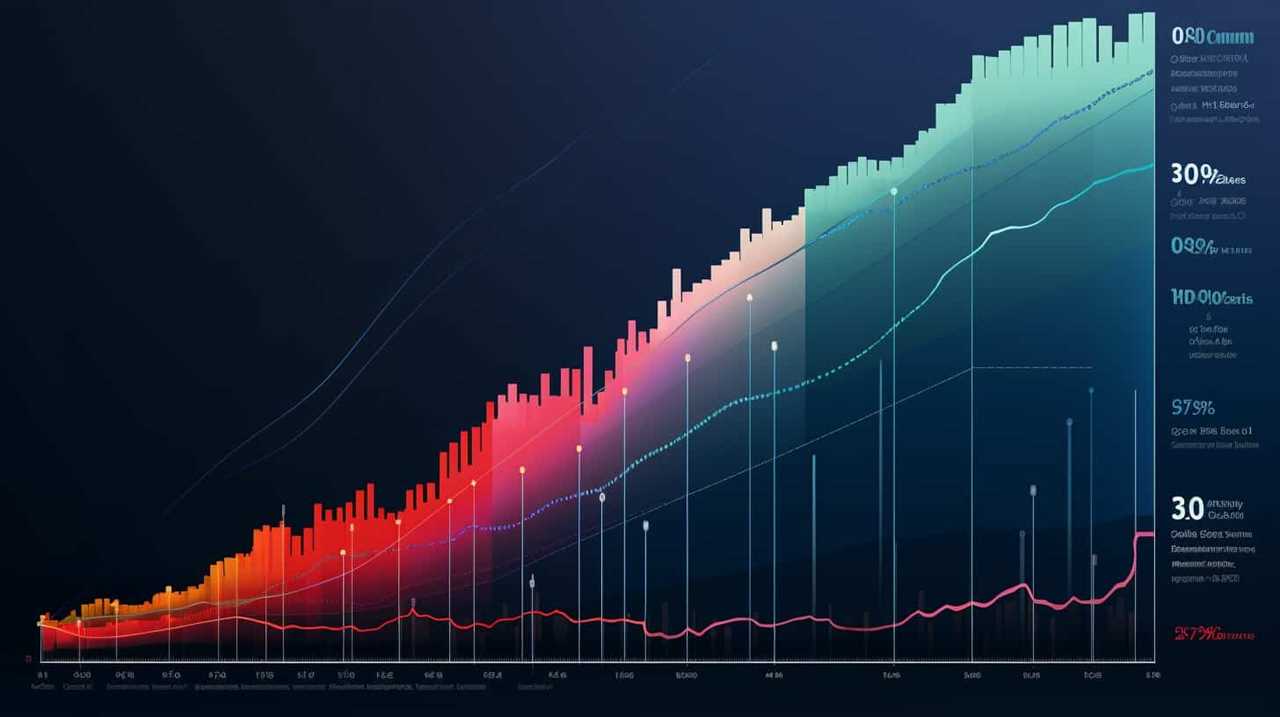We’re diving into the world of SEO, where key terms act as our navigational compass guiding us through the vast digital landscape.
In this article, we’ll explore the importance of key terms in SEO and how they impact search engine rankings.
We’ll also discuss how to choose the right key terms for your website and implement them effectively.
So, buckle up and get ready to master the art of key terms in SEO!

Key Takeaways
- Strategic use of relevant key terms is crucial for successful SEO.
- Thorough keyword research helps understand user search behavior and tailor content accordingly.
- Incorporating relevant key terms increases the chances of ranking higher in search engine results pages (SERPs).
- Key terms play a crucial role in determining search engine rankings.
Importance of Key Terms in SEO
One of the key factors in successful SEO is the strategic use of relevant key terms.
When it comes to optimizing content with key terms, conducting thorough keyword research is of utmost importance. Keyword research helps us understand what terms users are searching for and allows us to tailor our content accordingly.
By incorporating these relevant key terms into our content, we can increase our chances of ranking higher in search engine results pages (SERPs). Optimizing content with key terms involves strategically placing them in the title, headings, meta descriptions, and throughout the body of the content.
This not only helps search engines understand the relevance of our content but also improves the user experience by providing them with the information they’re looking for.

Therefore, investing time in keyword research and optimizing content with key terms is crucial for successful SEO.
Defining Key Terms and Keywords
To understand the importance of key terms in SEO, we must first define what key terms and keywords are.
Key terms refer to the specific words or phrases that are essential to a particular topic or industry. They’re the words that users are likely to search for when looking for information related to that topic.
Keywords, on the other hand, are the specific words or phrases that website owners and marketers target in their SEO efforts. They’re the words that are strategically incorporated into website content, meta tags, and other elements to improve search engine rankings.

Defining key term types involves categorizing key terms based on their relevance, competitiveness, and search volume. Understanding keyword research techniques is crucial in identifying the most effective keywords to target and optimize for in SEO campaigns.
How Key Terms Impact Search Engine Rankings
Key terms play a crucial role in determining the search engine rankings of a website. When it comes to optimizing key terms for voice search, it’s important to consider the natural language and conversational queries that users might use when speaking their search queries.
Voice search optimization involves incorporating long-tail keywords, question phrases, and location-based terms to align with user intent. Additionally, the impact of local key terms on search engine rankings can’t be overlooked. Including location-specific keywords in your content, meta tags, and URLs can help improve visibility in local search results. By targeting relevant local key terms, businesses can attract more local traffic and increase their chances of appearing in the top search results for location-based queries.
Now that we understand how key terms impact search engine rankings, let’s move on to the next section about choosing the right key terms for your website.

Choosing the Right Key Terms for Your Website
When it comes to choosing the right key terms for our website, there are a few important points to consider.
First, conducting a target audience analysis will help us understand what keywords our potential customers are using in their searches.
Second, competitor keyword research allows us to identify which terms are already being targeted by our competitors and find opportunities to differentiate ourselves.
Lastly, we need to decide between long-tail and short-tail keywords, considering factors such as search volume and competition.

Target Audience Analysis
We analyze our target audience to select the most appropriate key terms for our website. By identifying our target audience, we gain a better understanding of their needs, preferences, and behaviors. This information allows us to tailor our content and optimize our website to meet their expectations.
One important aspect of target audience analysis is understanding user intent. By understanding why our audience is searching for information, we can choose key terms that align with their intentions. This helps us attract the right visitors to our website and increase the chances of converting them into customers.
To illustrate the importance of target audience analysis, consider the following table:
| Target Audience | User Intent | Key Terms |
|---|---|---|
| Business owners | Researching marketing | Marketing strategies |
| Stay-at-home moms | Looking for parenting tips | Parenting advice |
| Fitness enthusiasts | Searching for workout routines | Exercise plans |
| Tech-savvy millennials | Seeking new gadgets and technology | Latest tech gadgets |
Competitor Keyword Research
Our competitor keyword research process involves identifying and selecting the most effective key terms for our website, ensuring that we stay ahead in the SEO game. To conduct a thorough competitor analysis and determine the best keywords for our website, we follow these steps:

- Identify our main competitors: We research and analyze the websites that are ranking well for our target keywords to understand their strategies.
- Analyze their keywords: We use keyword research tools to identify the key terms our competitors are targeting, including their high-ranking and high-traffic keywords.
- Evaluate keyword competition: We assess the competitiveness of each keyword by analyzing factors such as search volume, competition level, and relevance to our website.
- Select the right key terms: Based on our competitor analysis and keyword competition evaluation, we choose the most relevant and achievable key terms for our website.
Long-Tail Vs. Short-Tail
To effectively choose the right key terms for our website, it’s essential to understand the difference between long-tail and short-tail keywords.
Long-tail keywords are longer and more specific phrases that target a niche audience, while short-tail keywords are shorter and broader phrases that target a larger audience.
When conducting keyword research, it’s important to consider both types of keywords. Long-tail keywords may have lower search volume but higher conversion rates, as they’re more specific to the user’s intent.
Short-tail keywords, on the other hand, have higher search volume but may have lower conversion rates due to their broad nature.

Implementing Key Terms in On-Page Optimization
Now that we’ve chosen the right key terms for our website, it’s important to implement them effectively in our on-page optimization.
One important aspect to consider is keyword density, which refers to the frequency of our key terms in our website content. We need to ensure that our key terms are used naturally and strategically throughout our web pages.
Additionally, optimizing our meta tags, such as the meta title and meta description, with relevant key terms can greatly improve our website’s visibility in search engine results.
Keyword Density Importance
Implementing key terms in on-page optimization involves carefully considering the keyword density of your content. Keyword density refers to the percentage of times a keyword appears in your content compared to the total number of words. It’s an important factor in SEO as it helps search engines understand the relevance of your content to a particular keyword.

Here are four reasons why keyword density is important:
- Optimal keyword placement: By analyzing the keyword density, you can determine the best locations to include your keywords for maximum impact.
- Avoiding keyword stuffing: Maintaining a balanced keyword density helps you avoid the practice of keyword stuffing, which can lead to penalties from search engines.
- Providing clarity to search engines: Keyword density analysis helps search engines understand the main topic of your content and rank it accordingly.
- Improving user experience: By optimizing keyword placement and maintaining a reasonable keyword density, your content becomes more readable and engaging for users while still being SEO-friendly.
Optimizing Meta Tags
We optimize meta tags by strategically incorporating key terms into our on-page optimization. Meta tags, such as title tags and meta descriptions, play a crucial role in improving the visibility and click-through rates of our web pages. To optimize title tags, we ensure they are concise, keyword-rich, and accurately reflect the content of the page. By including relevant key terms in the title tag, we can improve our search engine rankings and attract more organic traffic. Similarly, meta descriptions provide a brief summary of the page’s content and should be optimized by incorporating key terms in a natural and compelling way. This helps search engines understand the page’s relevance and encourages users to click on our website in search results.
| Meta Tag | Purpose | Optimization Tips |
|---|---|---|
| Title Tags | Define the title of the page | Keep it under 60 characters, include primary keyword |
| Meta Descriptions | Provide a brief summary of the page’s content | Keep it under 160 characters, include relevant keywords, and create a compelling description |
| Keywords | Key terms related to the page’s content | Research relevant keywords and incorporate them naturally throughout the meta tags |
Optimizing these meta tags is essential for improving our website’s visibility and driving organic traffic. By strategically incorporating key terms, we can effectively communicate the relevance of our pages to search engines and attract the right audience.
Key Terms in Off-Page SEO Strategies
When it comes to off-page SEO strategies, our focus shifts to the key terms that play a vital role in boosting website rankings and driving organic traffic. These key terms are essential for optimizing the visibility and authority of your website on search engines.

Here are four key terms to consider in your off-page SEO techniques:
- Backlinks: Building high-quality backlinks from authoritative websites is crucial for improving your website’s credibility and search engine rankings.
- Anchor Text: Using relevant and keyword-rich anchor text in your backlinks helps search engines understand the context and relevance of your website.
- Social Signals: Engaging with your audience on social media platforms and generating social signals, such as likes, shares, and comments, can positively impact your website’s visibility and organic traffic.
- Brand Mentions: Getting mentioned or referenced by other reputable websites without a direct link can still contribute to your website’s credibility and authority.
By incorporating these key terms into your off-page SEO strategies, you can enhance your website’s visibility and drive more organic traffic.
Now let’s transition into the next section, where we’ll discuss monitoring and analyzing key term performance to further optimize your SEO efforts.
Monitoring and Analyzing Key Term Performance
To effectively gauge the effectiveness of our off-page SEO strategies, we need to closely monitor and analyze the performance of key terms in driving website visibility and organic traffic.

Analyzing keyword trends and tracking keyword rankings are essential in understanding how our SEO efforts are impacting our online presence.
By regularly monitoring keyword performance, we can identify which keywords are driving the most traffic and visibility to our website. This allows us to make data-driven decisions and optimize our SEO strategies accordingly.
Frequently Asked Questions
How Can I Track the Performance of My Chosen Key Terms in Seo?
To track the performance of our chosen key terms in SEO, we can use tools like Google Analytics and Search Console. These tools provide valuable insights into rankings, organic traffic, and user behavior, allowing us to make informed optimizations and improve our SEO strategy.
Are There Any Tools Available to Help Me Identify the Most Effective Key Terms for My Website?
There are top keyword research tools for SEO that can help us identify the most effective key terms for our website. By using these tools, we can implement effective strategies for identifying high performing key terms in SEO.

Should I Focus on Using Long-Tail Key Terms or Short-Tail Key Terms for Better SEO Results?
Using long-tail or short-tail key terms in SEO depends on the pros and cons of broad match terms and the impact of voice search. It’s important to consider these factors for better SEO results.
How Do External Factors, Such as Changes in Search Engine Algorithms, Affect the Performance of Key Terms in Seo?
Changes in search engine algorithms have a significant impact on SEO rankings. Optimizing key terms for better performance involves staying updated with these changes and adjusting our strategy accordingly.
Can I Use Key Terms From Competitor Websites to Improve My Own SEO Strategy?
Using competitor’s key terms in our SEO strategy can have advantages and disadvantages. It allows us to learn from their success, but we must be cautious of potential copyright issues and ensure our own unique value proposition.
Conclusion
In conclusion, key terms in SEO play a crucial role in improving search engine rankings and driving organic traffic to your website.

By carefully selecting and implementing the right key terms in your on-page optimization and off-page SEO strategies, you can enhance your online visibility and attract relevant visitors.
Monitoring and analyzing the performance of these key terms will help you refine your SEO efforts and stay ahead of the competition.
So, remember to choose your key terms wisely and watch your website soar to new heights!










